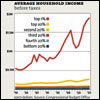
Session Overview
 |
Up to this point in the course, we have focused only on the outcomes generated by the market and their efficiency properties. Competitive equilibria in a market are typically efficient, but they may not be equitable: Some people may benefit greatly from the market's operation, while others do not. As a society, we may decide we want to alter these outcomes in a way that seems more equitable, but such changes typically come at the cost of efficiency. In this lecture, we will begin to learn about the efficiency-equity trade-off. How do we feel about differences in income? This lecture explores this question and the efficiency- equity trade-off. Image courtesy of Vince_Lamb on Flickr. |
Keywords: Income distribution; social welfare function; isowelfare curves; Utilitarianism; Raulsian criteria; Nozickian; commodity egalitarianism
Session Activities
Readings
Before watching the Lecture Video, read the course textbook for an introduction to the material covered in this session:
- [R&T] Chapter 19, "Inequality, Poverty, and Discrimination." Sections 19.1-2.
- [Perloff] Chapter 10, "General Equilibrium and Economic Welfare." (optional)
Lecture Videos
-
View Full Video
View by Chapter
- Overview of the Equity-Efficiency Tradeoff (0:06:31)
- Social Welfare Functions: Utilitarian, Rawlsian, Nozickian, Commodity Egalitarian (0:18:15)
- Income Distribution and Poverty (0:09:49)
- The Impact of Tax and Transfer (0:09:49)
Social Welfare Functions: Utilitarian, Rawlsian, Nozickian, Commodity Egalitarian
Resources
Check Yourself
Concept Quiz
This concept quiz covers key vocabulary terms and also tests your intuitive understanding of the material covered in this session. Complete this quiz before moving on to the next session to make sure you understand the concepts required to solve the mathematical and graphical problems that are the basis of this course.
Further Study
These optional resources are provided for students that wish to explore this topic more fully.
Textbook Study Materials
See the course website for Econ 302, Intermediate Microeconomics taught at Penn State in 2011.
